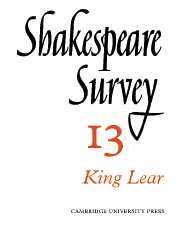Book contents
- Frontmatter
- The Catharsis of King Lear
- Lear’s Last Speech
- Albany
- Madness in King Lear
- The Influence of Gorboduc on King Lear
- Some Aspects of the Style of King Lear
- Keats and King Lear
- King Lear on the Stage: A Producer’s Reflections
- Costume in King Lear
- The Marriage-Contracts in Measure for Measure
- Tom Skelton—A Seventeenth-century Jester
- Illustrations of Social Life III: Street-Cries
- An Elizabethan Stage Drawing?
- Was there a Music-room in Shakespeare’s Globe?
- International Notes
- Shakespeare Productions in the United Kingdom: 1958
- Three Adaptations
- The Year's Contributions to Shakespearian Study 1 Critical Studies
- 2 Shakespeare’s Life, Times and Stage
- 3 Textual Studies
- Books Received
- Index
- Plate Section
Lear’s Last Speech
Published online by Cambridge University Press: 28 March 2007
- Frontmatter
- The Catharsis of King Lear
- Lear’s Last Speech
- Albany
- Madness in King Lear
- The Influence of Gorboduc on King Lear
- Some Aspects of the Style of King Lear
- Keats and King Lear
- King Lear on the Stage: A Producer’s Reflections
- Costume in King Lear
- The Marriage-Contracts in Measure for Measure
- Tom Skelton—A Seventeenth-century Jester
- Illustrations of Social Life III: Street-Cries
- An Elizabethan Stage Drawing?
- Was there a Music-room in Shakespeare’s Globe?
- International Notes
- Shakespeare Productions in the United Kingdom: 1958
- Three Adaptations
- The Year's Contributions to Shakespearian Study 1 Critical Studies
- 2 Shakespeare’s Life, Times and Stage
- 3 Textual Studies
- Books Received
- Index
- Plate Section
Summary
The suggestion that Lear dies from an unbearable joy induced by the belief that Cordelia is alive was first put forward by A. C. Bradley, and has been adopted by some subsequent critics. It deserves perhaps a fuller consideration than it is usually given. The point, after all, is not a small one. If he dies from joy thinking that Cordelia still lives he dies, unlike all other tragic heroes, not aware that any tragedy has taken place, for the other deaths are not to be thought of as tragic. Nor is the problem one which can be considered independently of an interpretation of the play as a whole. The question of Lear’s final consciousness is clearly part of the larger question of the interpretation to be given to the general theme of ignorance and knowledge which has an important role throughout the drama. I hope to show that an analysis of the various stages and forms which this theme takes helps in the interpretation of Lear’s last speech.
- Type
- Chapter
- Information
- Shakespeare Survey , pp. 11 - 19Publisher: Cambridge University PressPrint publication year: 1960

